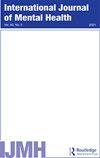新冠肺炎背景下,卫生专业学生对经历焦虑的人的帮助行为和态度
IF 1.7
Q3 PSYCHOLOGY, CLINICAL
引用次数: 1
摘要
摘要背景新冠肺炎大流行与精神疾病发病率增加有关,尽管与精神健康污名化态度和帮助意图的关联程度尚不清楚。目的这项基于渐晕的研究调查了卫生专业学生的态度和意图的差异,以帮助被描述为因新冠肺炎大流行而经历焦虑或没有恶化的个人。方法卫生与公共服务专业(n = 419)完成了一项在线调查,其中包括关于描述一个人经历焦虑的小插曲的问题。参与者被随机分配到两种渐晕状态中的一种,其中一种状态提到新冠肺炎加剧了患者的焦虑。结果当小插曲被框定为新冠肺炎引起的焦虑症状时,参与者不太可能赞同帮助行为,也不太可能愿意花时间与目标相处。结论尽管研究存在局限性,但研究结果揭示了未来研究的途径,可能有助于培训未来的卫生专业人员和防止污名化。本文章由计算机程序翻译,如有差异,请以英文原文为准。
Health professions student helping behaviors and attitudes toward a person experiencing anxiety within the context of COVID-19
Abstract Background The COVID-19 pandemic has been associated with increased mental illness rates, although the degree to which is associated with mental health stigmatizing attitudes and helping intentions is unknown. Aims This vignette-based study examined differences in health professions students’ attitudes and intentions to help an individual described as experiencing anxiety with or without exacerbation due to the COVID-19 pandemic. Methods College students majoring in health and human service professions (n = 419) completed an online survey, including questions about a vignette describing a person experiencing anxiety. Participants were randomly assigned to one of two vignette conditions, with one condition mentioning COVID-19 exacerbated the person’s anxiety. Results When the vignette was framed as anxiety symptoms due to COVID-19, participants were less likely to endorse helping behaviors and were less likely to be willing to spend time with the target. Conclusions Despite the study limitations, results reveal avenues for future research that may aid in training future health professionals and preventing stigma.
求助全文
通过发布文献求助,成功后即可免费获取论文全文。
去求助
来源期刊

INTERNATIONAL JOURNAL OF MENTAL HEALTH
PSYCHOLOGY, CLINICAL-
CiteScore
3.80
自引率
20.00%
发文量
32
期刊介绍:
The official journal of the World Association for Psychosocial Rehabilitation, the International Journal of Mental Health features in-depth articles on research, clinical practice, and the organization and delivery of mental health services around the world. Covering both developed and developing countries, it provides vital information on important new ideas and trends in community mental health, social psychiatry, psychiatric epidemiology, prevention, treatment, and psychosocial rehabilitation.
 求助内容:
求助内容: 应助结果提醒方式:
应助结果提醒方式:


